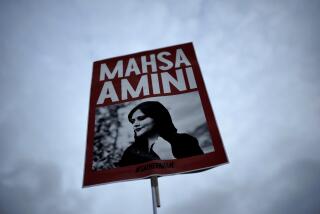Speculation grows over health of Iran’s supreme leader
The media office of Iran’s supreme leader, Ayatollah Ali Khamenei, this month sent an unusual text message: For the first time since having prostate surgery in September, Khamenei had resumed his weekly hikes in the hills of Tehran.
Attached was a photo of him dressed in a robe and making his way up a rocky slope.
The message from the media office, which normally sends information about Khamenei’s speeches or books he has read, followed frequent photos posted on his official Twitter account showing him receiving visitors in a hospital.
The news alerts that deal with Khamenei’s health and show a more informal side of him come amid rampant — though secretive — speculation that Khamenei, 75, who survived an assassination attempt in the early days of the Islamic Revolution, is terminally ill.
As the country’s highest-ranking official, Khamenei controls all branches of government in addition to the Iranian Revolutionary Guard Corps and other aspects of public life in Iran. Since assuming the leadership in 1989, Khamenei has made himself an indispensable aspect of Iranian politics, culture and life. Nothing happens in Iranian politics or governance, no matter how trivial, without Khamenei weighing in.
As in nearby Arab nations, the leader’s photo and image are ubiquitous throughout his country.
“If, God forbid, his eminence passes away, the country will face commotion and turbulence,” said Effat Sarabi, an 84-year-old Tehran resident who has been closely following the news of Khamenei’s surgery and recovery. “Internal struggles of power will rise to an uncontrollable level.”
The death of the supreme leader could lead to a power vacuum in Iran at a time when gridlocked nuclear negotiations are at risk of failing, the economy continues to suffer from crippling international sanctions and attempted reforms by President Hassan Rouhani have gone nowhere, some observers say.
Others see his eventual death as a chance for the country to reform by bolstering personal liberties, freeing political prisoners and establishing better foreign relations to ease the sanctions.
“There will be no real change in foreign and domestic policies unless he passes away,” said Abdullah, a Tehran resident who didn’t want his last name published for security reasons. “After him there will be commotion and if reformists can grab power, the paradigm shift in Iran will be realized.”
There are already reports that the Assembly of Experts, a council of clerics who appoint the supreme leader, is holding secret meetings in preparation for the need to choose a successor.
But politicians, religious leaders and analysts are reluctant to entertain the possibility publicly, lest it be seen as sounding the death knell for a beloved and powerful leader. Even political reformists — who in private welcome a new supreme leader as it could herald the reforms they have clamored for — don’t dare openly talk of his replacement. When they speak of the flaws of the country’s government, it is couched as a mismanagement of the supreme leader’s decrees or guidelines.
“The only solution is his eminence in his own lifetime to choose someone as deputy and prepare him as his own substitute,” said Farshad Ghorbanpour, an analyst and historian who was jailed for eight months after the disputed 2009 elections.
For his part, Khamenei doesn’t appear to be considering the need for a replacement, instead intent on showing his vigor and essential role in Iranian political discourse.
But much concern lies in the fact that Khamenei has neither appointed nor hinted at a successor and as there have been only two supreme leaders in the history of the Islamic Republic, there is little precedent. In 1989, when Ayatollah Ruhollah Khomeini died, Khamenei was appointed with the support of then-President Ali Akbar Hashemi Rafsanjani.
Khamenei’s appointment was opposed by some clerics, and he had to work to gain their confidence. Another ayatollah is likely to eventually gain the same devotion in a country where even the enemies bow down before the supreme leader.
“Who the next leader is is an irrelevant question now because the regime can handle it easily and sell it to the people,” said Nader Karimi Juni, a political analyst who spent three years in jail for political dissent. “And they will accept it and will adore the next one as they have done the current one.”
Mostaghim is a special correspondent.
More to Read
Start your day right
Sign up for Essential California for news, features and recommendations from the L.A. Times and beyond in your inbox six days a week.
You may occasionally receive promotional content from the Los Angeles Times.






